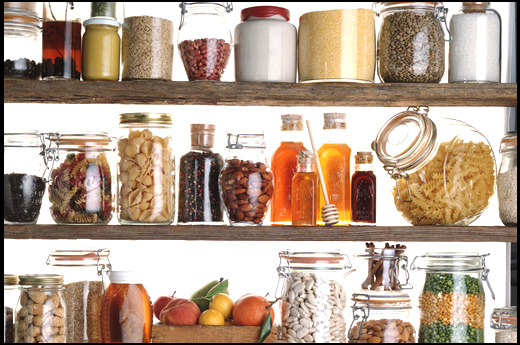There are so many approaches to clean and healthy eating. One of the best ways to make more nourishing choices is to stock your pantry with healthier food. I’ve found that there are a few easy swaps that significantly enhance the nutritional value of what you’re eating and help you get rid of the processed junk.
Here are my top five quick pantry upgrades –
Quinoa Pasta instead of Regular Pasta: This is the simplest way to transform a meal high in not-so-good refined carbs into a totally healthy plant-based complete protein. Quinoa pasta is now mainstream because of many people looking for gluten-free pasta alternatives. Even if you eat gluten I suggest making this switch. Quinoa pasta is totally delicious and doesn’t have the heavy texture and distracting flavor of many whole wheat pastas. I promise you can make this swap without anyone in your household even knowing!
Almond Butter instead of Peanut Butter: Nut butters are a terrific source of healthy fats, protein, and vitamins, but some are better for you than others. Peanut butter is the old standby, but in fact it’s not the healthiest nut butter available and can pose some health risks. When peanuts are stored they can grow a mold that produces aflatoxin, which is a carcinogen and can be dangerous for the liver. Given this, almond butter is a much safer alternative. It has a delicious nutty flavor and actually offers even more nutrients than peanut butter does. In particular almond butter has higher levels of vitamin E and magnesium – vitamin E is a powerful antioxidant that supports the cardiovascular system and magnesium is particularly important for bone health. I still use peanut butter when I’m making a peanut sauce, but use almond butter for all my other nut butter needs. It is especially tasty on toast with a drizzle of honey.
Grains instead of Couscous: For some reason people often believe that couscous is a whole grain, when in fact it is just really tiny pasta. It has all the same issues as it’s refined carbohydrate cousins and doesn’t offer much nutritional value. Try making millet, quinoa, or brown rice instead of couscous in the future. Each of those whole grains is bursting with nutrients and fiber.
Jared or Boxed Tomatoes instead of Canned Tomatoes: The natural acid in tomatoes makes it quite unsafe to eat from a can. You can find some varieties that are labeled as BPA free (OK to eat those!), but in general it is safer to eat tomato products from glass jars or paper boxes where there isn’t any risk of leaking. Keep a particular eye out for a good brand of tomato paste – the extra cooking time to make the paste also makes the lycopene particularly bioavailable. Ideally we should all be eating a spoonful of tomato paste every day.
Bragg’s Liquid Aminos instead of Conventional Soy Sauce: Soy sauce is a great condiment to use in cooking, but it tends to be filled with sodium. I prefer to use Bragg’s liquid aminos, which has a similar flavor without any added sodium. Liquid aminos are made from fermented soy beans and actually help the body absorb nutrients from food. You can make a 1:1 substitution in any recipes that call for soy sauce or tamari.

Leave a Reply